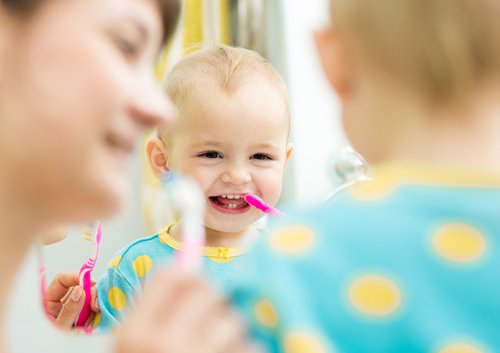
A new baby! What a joyful, exciting time! Joy, excitement, and lots of questions about the best ways to keep your child healthy and happy. So, we have some suggestions to help start your baby on the path to a lifetime of healthy, happy smiles.
- Before Those First Baby Teeth Appear
After each bottle or breast feeding, it’s a good idea to wipe your baby’s gums with a clean, damp washcloth or gauze pad wrapped around one of your fingers.
This gentle cleaning helps wipe away food and bacteria that can irritate the gums as the teeth start to erupt and helps prepare your child for brushing once those little teeth have arrived.
- Cleaning Your Baby’s Teeth
Most babies start getting their first teeth around the age of six months. And those first teeth mean it’s time for a first toothbrush!
Choose a brush specifically for babies. These brushes are designed to fit tiny mouths to prevent gagging. They have soft bristles to protect tooth enamel and gums. They have handles that are easy for you to maneuver. There are even silicone finger brushes available which fit over your finger and use a textured surface to brush away bacteria and food particles.
Ask Drs. Don and Mindy about the right time to start using toothpaste. When your baby is old enough for toothpaste, it’s important to choose the right one, which means a toothpaste formulated for infants. It’s also important to use the right amount of toothpaste. A smear of toothpaste no bigger than a grain of rice grain is enough for early brushing.
Brushing twice a day, morning and night, is the normal recommendation unless your pediatric dentist has other advice. We’re also a great source of information on how to make brushing time easier and more enjoyable for both you and your baby!
Cavities begin forming because oral bacteria create acids which erode enamel, the protective outer coating of the tooth. Cavity-causing bacteria love to feed on sugar. Baby formula and even breast milk contain carbohydrates in the form of sugars—which is a good thing!
Carbohydrates are essential for babies’ growth and development. Lactose, the sugar found in breast milk, is a carb which is easy for your baby to digest, and which supports healthy bacteria in the digestive system. Formulas with lactose and other types of sugars also provide your baby with these necessary, easily digestible carbohydrates.
But going to sleep with a bottle or while breastfeeding means those healthy sugars aren’t all digested. Instead, liquid pools in the mouth, bathing those beautiful new teeth in sugars over night. This can lead to a condition called “baby bottle tooth decay,” which is especially damaging to the upper front teeth. (And the chance of cavities is even greater if your child’s bottle contains juice or other sugared drinks.)
That’s why dentists recommend making sure a baby’s finished with breastfeeding or bottle before going to sleep to help prevent cavities and decay.
Baby teeth are important. They help in speech development. They allow your child to eat and chew properly when it’s time for solid foods. They hold places for permanent teeth so the adult teeth erupt where they’re supposed to. All very good reasons to finish feeding baby before bedtime!
When your baby has those first teeth, and certainly by the age of 12 months, it’s time to add some new friends to your baby’s life with a first visit to our Charleston pediatric dental office.
Pediatric dentists have specialized training in caring for children’s teeth. They can assess tooth and bite development. They are experts in treating decay and injuries in primary teeth. They can advise parents on any potential problems with pacifier or thumb sucking habits. And they know how to make sure children are comfortable in a child-friendly environment.
That first checkup will allow Drs. Don and Mindy to make sure your baby’s dental development is on schedule. There will be an exam to check those tiny teeth for enamel erosion or cavities. And you dentist will have great advice for proactive dental care, for diet, and for tips on how to brush most effectively.
These early visits are also a chance for your child to become accustomed to visiting the dentist regularly. Your pediatric dentist and staff are experts at creating a dental home, with welcoming, child-oriented dental care which provides comforting continuity from infancy through the teenage years. Look after your baby’s teeth right from the start, and you can look forward to seeing your baby grow up with a healthy and happy smile!



